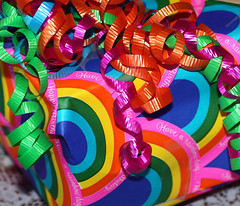
“I kind of like that big 80s look.” — My dad.
That’s what my dad said to me regularly when I was a child and would get upset about my Q-tip-poof hairstyle. Every morning I’d brush my hair and every morning it would flair out cartoon-style in a triangle of frizz. All I wanted as a child were long, luxurious locks of hair that felt to my waste in perfectly straight strands. And that was the exact opposite of what I had.
That’s because even though my hair should have fallen in shiny ringlets, I didn’t learn the right way to care for it for years. With a straight-haired mother and father who were devotees of short cuts, I had no one who could teach me how to work with my tresses and so I assumed I just had “bad hair.” Then a haircut changed my life. After some experimentation I realized my hair wasn’t naturally gigantic, just curly (and brushing it wasn’t doing me any favors). So I hacked it off and stopped brushing it dry and thus began my quest for learning to love curly hair.
Why is Hair Curly?

Curly and straight hair actually have different structures that causes them to hang straight or spiral. It’s the hair follicle, which is a tube that can be circular or oval and give hair its shape.
Straight hair follicles are circular, while curly hair has an oval shape. In this NPR article, Dr. Paradi Mirmirani, a California dermatologist specializing in hair explained it with the analogy of a gift-wrapping ribbon.
When the follicle is straight, it’s like the untouched ribbon, both side are equal and thus there’s a balance. When one side is made flat with the edge of the scissors, it disrupts that balance and creates a curling effect.
Curly Hair Is Drier Than Straight Hair

For those most part, you shouldn’t shampoo it every day. You just shouldn’t. The only people who really get a pass on that are people with extra fine hair that shows oil very quickly.
Whatever your excuse is, such as “I don’t feel clean.” Shush. Let me explain why washing your hair with shampoo everyday probably isn’t doing you any good.
When your straight-locked counterparts’ scalp creates sebum (a natural oil), it travels down their strands and make them soft and silky. It happens naturally, but it also happens when they brush their hair, when they run their fingers through their hair — essentially when they do things that people with curly hair don’t do — and is what inevitably makes their hair seem “dirty.”
That doesn’t happen as often for people with curly hair, which means they don’t have the same degree of natural moisturizing. So washing hair every day will undoubtedly lead to frizzy, unmanageable hair for most people.
The curlier and coarser your hair is, the less often you should wash it with shampoo. Think once a week for very curly and/or coarse hair, two to three times a week for medium curly hair, and every day for wavy or fine hair.
How Do I Wash it?

I’m not actually a fan of showering every single day, because it can strip the skin and hair of its natural moisture and breaks down the skin barrier (though there are certainly parts of the body I’d recommend cleaning everyday). But you can shower every day if you use a conditioner and not a shampoo — something naturallycurly.com calls “co-washing.”
[Read More: The Great Shower Debate: Is Everyday Too Much for Your Skin?]
Essentially, you just use conditioner in the shower instead of shampoo and conditioner. Some women with curly hair never use shampoo and only condition. Some — like me — use shampoo just two to three times a week. To be perfectly honest, it’s kind of about getting away with shampooing as seldom because that gives you hair the most time possible to suck up natural oils. Just make sure to condition every single time you use shampoo.
But if you do decide to use the co-washing method, consider using a water-soluble, silicone-free conditioner. Silicones do great things to keep hair moisturized, but if you’re not using shampoo to cleanse you could end up with a silicone-build-up.
[Read More: Does Your Shampoo or Conditioner Really Make a Difference?]
Bottom Line

Curly hair happens because the hair follicle is oval instead of circular, as with straight hair. Curly hair can be particularly difficult to manage. One of the reasons is that the same system might not work for two people who seem to have similar hair. But there are a few tips that almost universally apply to curly-haired people. Don’t shampoo every day unless you have very fine or wavy hair that shows oil quickly. If you wash it daily, consider “co-washing” but watch out for conditioners with silicone if you shampoo minimally because they can cause silicone-buildup. And always be sure to condition after shampooing.
 Some great washing products for curly hair are Aubrey Organics Honeysuckle Rose Shampoo ($6.38, amazon.com) and Conditioner ($9.76, amazon.com) with coconut oil and soy protein in the shampoo and cetyl alcohol and shea butter, this shampoo/conditioner combo is super moisturizing.
Some great washing products for curly hair are Aubrey Organics Honeysuckle Rose Shampoo ($6.38, amazon.com) and Conditioner ($9.76, amazon.com) with coconut oil and soy protein in the shampoo and cetyl alcohol and shea butter, this shampoo/conditioner combo is super moisturizing.
 WEN Sweet Almond Mint Cleansing Conditioner ($25.99, amazon.com), as it name suggests, conditions without a shampoo, which can contain harsh ingredients like sodium lauryl sulfate, which gives cleansers their suds.
WEN Sweet Almond Mint Cleansing Conditioner ($25.99, amazon.com), as it name suggests, conditions without a shampoo, which can contain harsh ingredients like sodium lauryl sulfate, which gives cleansers their suds.
Sources: About.com, NaturallyCurly.com, NPR

